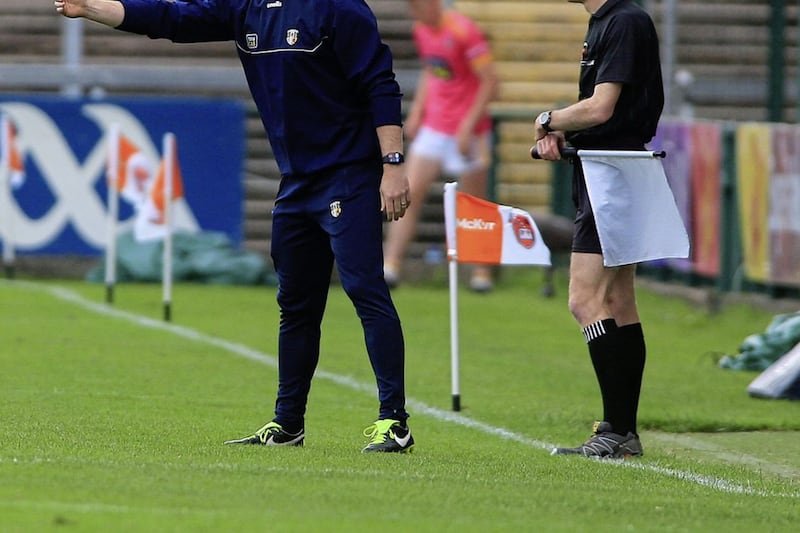THEREhas been a definite change in the weather this past week and with it comes memories of the distinct flatness I felt when faced with training or games at this time of year. The obvious exceptions were when I was lucky enough to have qualified for a crack at the provincial club championships. Then, with the confidence and buzz of a championship victory in your sails, training was a highlight rather than a chore. The fact that you knew you were one of the very few club teams in the country left with anything meaningful to play for was a sweet and easy pill to swallow.
At times like this, the harsher weather was somehow a reminder of your success and the dedication it took to get there.
Of course, for many clubs across Ulster, this past month’s football has been an exercise of forbearance rather than joy.
I speak of course of the wrapping up of league campaigns.
For some reason the club season in many counties refuses to follow the key format rule that defines the county season, that is, the completion of league prior to commencement of championship. Following this pattern, the season for every team crescendos, as it should, with their final championship game, be that in the first round or the final. Crucially, this avoids one of the crappiest moments as a club player – having to lift yourself after a championship defeat, to somehow go again in remaining games, when your hopes and aspirations for the year lie in ruins on the championship dressing room floor.
The only thing any player and manager wants to do at that stage is to put the boots in the bag and close the zip on that year.
Instead, having final games to play, the team will limp on.
The best set-ups, to their endless credit, will find a second wind to go again and in doing so can sometimes create the foundations from where future victories will be built.
For many, and even for these teams that do turn it around, it is far from ideal.
Some end-of-year league games are completely meaningless, as one or both teams have literally nothing to play for.
These games are played between half-interested players and in front of even less interested supporters.
Play-off games and league finals are better and certainly in Tyrone, the league title is usually hard fought and valued.
Even with this though, it has been allowed to drag on much longer than it should’ve done.
To be fair, from a fixtures point of view, it can be difficult to get leagues played off due to the necessity of having full teams, which include county players, for final play-off games.
Traditionally, leagues were won or lost by simple league standings at the end of the season.
With the adoption of ‘starred games’, many counties moved to a play-off system to ensure teams would have their full player body for the decisive
end-of-season games.
The system of starred games, however, has worked to such an extent and carries enough fairness that many would now accept once again the simple finishing league table positions. Certainly, at the top of the pile, I think most teams would be quite happy with a winner-takes-all policy removing the need for play-offs.
It is, of course, slightly different for the teams with a notable county contingent that have promotion and relegation issues at hand.
However, numbers of such clubs would be small and I think, in many cases, teams would be happy to look at other options.
Some will argue that if teams are finished when out of the championship, it shortens their season too much, especially in counties with straight knock-out championship formats, which in turn, goes against the demands from club players for an improved fixture calendar. I don’t believe for a second that club players are demanding a long season.
Regular games and a more condensed season are not mutually exclusive and in fact would carry knock-on benefits.
The level of commitment required by teams to remain competitive has continually ramped up for as long as I remember.
It’s hard to see where the further increases can be made as there is only so much time in a week, but I remember thinking similarly back in the early Noughties. Yet, what was considered high level preparation then, would be considered the norm in the modern game.
These demands place big strains on players, particular those playing for multiple teams, or those in their later years, where the pressures of balancing work, family and sport results in fewer and fewer players playing into their 30s. Then there is the financial and pitch pressures of running a senior team over a 10-month season rather than a potential six-month season.
Even if there is not an outside manager to pay, there will still be significant costs involved in running teams, such is the wide array of costly add-ons in modern team’s preparation.
Putting this in context, the average club will play between 15 and 20 games in a year.
Taking this year, the ‘club month’ of April allowed five of these games to be played. Championship involvement, accounting for two or three of a season’s games for most teams, ran for a month over September/October.
That leaves over four months in between for playing the remaining 10 or so games. Yet here we are in November with fixtures in at least four counties still to play.
Starting the club year in April has always felt too late to me.
Teams get back out after Christmas and are mad for grass.
With the county league games awakening everyone’s interests after the winter break, enthusiasm is strong and all dreams for the season ahead are intact.
To improve this, games could be played in a ‘starred plus’ manner where, if the county team plays in the league on a Saturday evening, there could be club games on the Sunday.
These could include all county players not fully involved in the respective previous night’s county game.
Such a format would benefit the county team, clubs and the players themselves, as well as getting the leagues kicked off several weeks earlier than they currently are.
Yes, it would take that rarest of GAA things – a mature agreement – to avoid pressure on county players to play both games, but for an improved and condensed fixture calendar, surely that could be achieved.
Croke Park have taken the leap of faith to abandon the month of September for All-Ireland finals in football and hurling and condense the county season.
This is the first season of the new calendar and so a learning process must be expected and maybe further changes are afoot. It would certainly be a great pity if the county season was put on a diet only for the club season to bloat out to fill the space.
A leaner, condensed club season would be great to see for both players and clubs alike.
To me the opportunity is there like never before, yet it will still take bright minds to make the very most of it.








